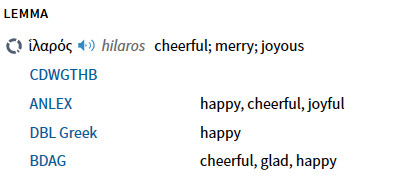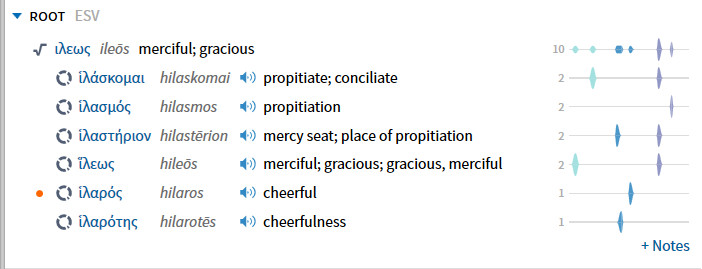Cheerful
- 2016-05-16
- By Editor
- Posted in Bible Study, Word Study
Word Study: “cheerfully happy” – “hilaros” G2431
The Greek word translated “Cheerful” is only used one time in the Bible and it is at 2 Corinthians 9:7. Interestingly that when it is used it applies to the stewardship of giving to God with a happy attitude.
2 Corinthians 9:7 (ESV)
7 Each one must give as he has decided in his heart, not reluctantly or under compulsion, for God loves a cheerful (G2431 – LN25.117) giver.
2431 ἱλαρός [hilaros /hil·ar·os/] adj. From the same as 2436; TDNT 3:297; TDNTA 362; GK 2659; AV translates as “cheerful” once. 1 cheerful, joyous, prompt to do anything.[1]
25.117 ἱλαρός, ά, όν: pertaining to being cheerfully happy—‘happy, cheerful, one who is happy.’ ἱλαρὸν γὰρ δότην ἀγαπᾷ ὁ θεός ‘for God loves the one who is cheerful as he gives’ 2 Cor 9:7.[2]
The Greek word for “Cheerful” has the sense meaning of “Cheerfully Happy”. Note the Lemma Translation spelling of: hilaros and if pronounced in English it would sound like the English Word of “hilarious” Synonyms would be: hysterical – uproarious – comical – etc. O Greek it is pronounced phonetically like this: e.la.ros
However, the Pronunciation in Greek would be differing than those letters in English. Yet one would get the idea and interestingly the meaning and ‘hilarious’ would fit together.
The translation strip is:
The three major Greek dictionaries (2Cor97d):
The Root (2cor97r):
This is the only place that this Greek word is used in the Scriptures.
The Parallel Passages that are in the Old Testament Quotations and have an Allusions in the New Testament would be: Provers 22:8 (OT) and 2 Corinthians 9:7 (NT).
Proverbs 22:8 (ESV)
8 Whoever sows injustice will reap calamity, and the rod of his fury will fail.
A quote from a sermon given by Charles H. Spurgeon with 2 Cor. 9:7 being the key text:
A man who gives to God cheerfully has got beyond the serf-like, slavish spirit. The slave brings his pittance, which he is obliged to pay, and puts it down at the task-master’s feet, and goes his way in misery. But the dear child, so pleased to give its Father what it can, places its little offering into the Father’s treasury, as much as possible unobserved of men, beholds the Father smile, and goes its way rejoicing. You are not under the law but under grace; you are not, therefore, to give or to do anything to God as of compulsion, as though you heard the old Mosaic whip cracking in your ears. You are not to crouch before the Lord as the child of Hagar the bondwoman, fresh from Arabia and from the tremblings of Sinai; but you are to advance cheerfully as one who has come to Mount Zion, as the child of promise—as Isaac, whose name is laughter; rejoicing that you are enabled, and favoured, and privileged to do anything for him who loved you to the death.
One thing I know, that a cheerful giver always wishes that he could give ten times as much. A cheerful doer always wants to have more capacity for doing. A cheerful preacher always wishes that he had a thousand tongues, for not one should silent be. Beloved, do you never remember wishing that for once you could get out of this dull common life, and climb into the higher spiritual life? …. Then we should teach, and preach, and pray, and work, and give with such a spirit and such a divine unction, that the world would wonder whence we came, and where we had learned these sacred arts. It is this cheerfulness, this heartiness, this whole-heartedness, this intenseness, this fire of the soul, which God loves. O that we may have it! O may we get it, for such doers and such givers God loves.
The concluding paragraph of his sermon:
“God loveth a cheerful giver,” and you see his claims upon you. Go your ways, merchants, and give largely as God gives to you. Go your ways, you tradespeople, and scatter as you can, for God first gives you the means. Go your ways, you working men and toiling women, and give according to your ability. Give, you rich, because you are rich, and give, you poor, because you cannot afford to get poorer, and you are likely to do so unless you offer God his portion. Only have you first given him your heart? Have you put your trust in Jesus? If not, this sermon is not for you; but if your hearts belong to my Lord, and have been washed in his precious blood, let my text sink deep into your ears, and deeper still into your hearts—“God loveth a cheerful giver.”[3]
[1] Strong, J. (1995). Enhanced Strong’s Lexicon. Woodside Bible Fellowship.
[2] Louw, J. P., & Nida, E. A. (1996). Greek-English lexicon of the New Testament: based on semantic domains (electronic ed. of the 2nd edition., Vol. 1, p. 301). New York: United Bible Societies.
[3] Spurgeon, C. H. (1868). A Cheerful Giver Beloved of God. In The Metropolitan Tabernacle Pulpit Sermons (Vol. 14, p. 576). London: Passmore & Alabaster.
Recent Posts
Archives
- April 2022
- February 2022
- November 2021
- October 2021
- August 2021
- July 2021
- May 2021
- April 2021
- September 2020
- August 2020
- June 2020
- March 2020
- February 2020
- November 2019
- October 2019
- September 2019
- August 2019
- July 2019
- June 2019
- May 2019
- January 2019
- December 2018
- October 2018
- August 2018
- June 2018
- February 2018
- January 2018
- December 2017
- November 2017
- January 2017
- December 2016
- November 2016
- October 2016
- September 2016
- August 2016
- July 2016
- June 2016
- May 2016
- April 2016
- March 2016
- February 2016
- January 2016
- December 2015
- November 2015
- September 2015
- August 2015
- June 2015
- January 2015
- December 2014
- November 2014
- October 2014
- September 2014
- August 2014
- July 2014
- June 2014
- May 2014
- April 2014
- March 2014
- February 2014
- January 2014
- December 2013
- November 2013
- October 2013
- September 2013
- August 2013
- July 2013
- June 2013
- May 2013
- April 2013
- February 2013
- January 2013
- December 2012
- November 2012
- October 2012
- September 2012
- August 2012
- July 2012
- August 2011
Categories
- Bible Discussion
- Bible Questions Answered
- Bible Study
- Bible Study Made Easy
- Bible Study Via Software
- Bible Topics
- Christ day and time
- Demo Articles
- Developing
- FP RokTabs #1
- FP RokTabs #2
- God's Amazing Convents
- History of the English Bible
- Home & Family
- Illustrations
- Manifestations
- Marriage
- Men
- Men in the Bible
- RokNewsFlash
- RokNewsPager
- RokStories
- Spirituality
- Sub RokTabs
- Uncategorized
- Various Articles/Topics
- Word
- Word Study



